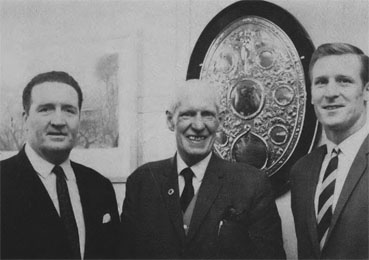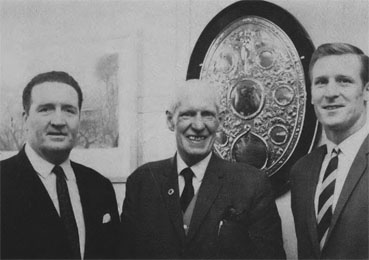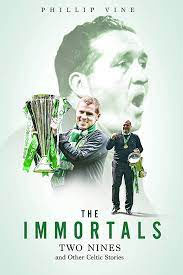Philip Vine in his book ‘Immortals’ looks back at a time when it was the board instead of the fans at the centre of a flag flutter.
In the North British Hotel, Kelly’s mind wandered momentarily as he watched heads nod in agreement to the appointment of Jock Stein as manager of Celtic. He thought back to his earlier meetings with the man he was poaching from rivals Hibernian. He recalled stories of derring-do and under-the-counter payments in the days of the Founding Fathers of Celtic, of how John Glass and his colleagues had betrayed the trust of the Edinburgh Catholic club and stole their best players from under their very noses. He thought back to the original Celtic members’ pledge to non-sectarianism in their recruitment of players.
Still, though, he worried.
In spite of the inclusivity of Celtic’s early history – the club bought in the best players money could buy – and in spite of the clever appropriation of a name that suggested the encompassing of all Celtic nations, the club of the Kelly family had always been supported by a predominantly Catholic and Irish – and generally republican – fanbase. It was the fact that Stein came from staunchly Protestant stock that worried Kelly now, and it had done since the confidential negotiations
with the Hibernian manager had begun. It was why, in their initial meeting Kelly had offered Stein only the assistant manager’s position.
True, it was also because the chairman was a man who hated to hurt feelings and McGrory’s deputy, Sean Fallon, would have expected the manager’s job if and when the current incumbent was to be moved to one side. This Protestantism, however, was a real concern. Clearly,
Stein was the outstanding candidate for the manager’s role – his work at Dunfermline and at Hibs had proved that – but he was a man from Burnbank whose family were all dyed-in-the-wool Rangers supporters and he was a man who would not be able to accompany Celtic players to Mass on matchday mornings. It was why, at Kelly’s second meeting with Stein, he offered him a joint managerial role with Fallon.
Stein, though, was a gambling man, a poker player as well as a Protestant, and turned down Kelly’s opening gambits as easily as if they had been extra cards offered to a man with a full house.
He mentioned an approach from down south, from Wolverhampton Wanderers. He wondered whether Kelly might offer an opinion as to whether he should take the job with the English giants.
In the end, Kelly offered Stein the manager’s role and full control, too, over team selection. It was as great a revolution at Celtic as it might be possible to imagine, and Kelly and his fellow directors deserve some credit for looking the inevitable in the face, staring down its eyes, and
making peace with change.
Later, Kelly tried to garner all the credit both for his original appointment of Stein as Celtic reserve team manager in 1957 and for his reappointment as first team supremo in 1965. He professed it to have been the culmination of a long-plotted plan. Stein would be allowed to leave Celtic in 1960 in spite of his revolutionary work with the reserve team, with his proteges breaking through into McGrory’s and Fallon’s first team. Players including Billy McNeill, Bertie Auld, Stevie Chalmers, John Clark, Paddy Crerand, Charlie Gallagher, Tommy Gemmell, Jimmy Johnstone, Bobby Lennox and Bobby Murdoch all came under the tutelage of Stein.
When Billy McNeill heard of the homecoming of his mentor, Stein, he immediately abandoned plans to leave the club.
Stein, Kelly said, was allowed to leave Celtic on a temporary basis to gain experience at Dunfermline and elsewhere if necessary, before a triumphant return to Paradise. It was nonsense, of course. Just as was the denial of problems with Stein’s Protestantism. McNeill himself said, ‘Let’s not beat about the bush. They were reluctant to give him full control because he was a Protestant.’ Stein’s wife, Jean, said, ‘John was more or less told by the chairman in 1960 that he had gone as far as he could with Celtic, coaching the second team.’ After all, the reserve team’s mentoring was the sole reason he was brought to the club in the first place. On the recommendation of Jimmy Gribben.
Whether or not any serious objections were raised by White, Devlin or Farrell on that fateful day in January 1965 at the North British Hotel, Kelly had his way and had his man, even if it was the desperation of the club’s situation that had driven Kelly to take the risk of appointing a Protestant manager to an Irish Catholic institution.
Despite his deceit and his dissembling over the Stein appointment, Kelly deserves his place among the Celtic immortals.
On other occasions, he was the man of iron will and unbending principles who stood alone against the prejudice of the powerbrokers of the Scottish Football Association in 1952 and even against the armed might of the Soviet Union in 1968. The flag controversy, originating with the SFA’s ordering of the removal of the Irish flag that flew from one end of the old covered enclosure and above Celtic fans congregating in the Jungle section of Paradise, needs to be seen in context.
This particular flag, the tricolour of the newly independent Free State, had been a gift to the club by the first Irish Taoiseach, Eamon De Valera. Since the opening of Paradise, however, the old Irish flag with a golden harp set against a background of emerald green had always been flown. It was a recognition, an acknowledgement, of Celtic’s origins in the Irish Holocaust and the subsequent emigration to Glasgow.
The diktat by the SFA had originated in a suggestion by Glasgow magistrates after crowd trouble at the January 1952 derby at Celtic Park, ‘The two clubs should avoid displaying flags which might incite feeling among the spectators.’
Only Celtic were instructed by the SFA to remove a flag.
The Referee Committee ruled that ‘Celtic be asked to refrain from displaying in its park any flag or emblem that had no association with the country or the sport’.
Kelly was still relatively new to power at Celtic, becoming chairman five years earlier on the death of Tom White. In theory, a triumvirate of directors, Kelly, Desmond White and Tom Devlin Jr, were the decision makers inside the gates of Paradise. All three had inherited shares and power from their fathers.
Shareholding systems within privately owned limited companies make both nepotism and patriarchy inevitable. In effect, a combination of his father’s shares and his family’s assiduously
cultivated friendship with the Grants and the Colgans whose 1,100-plus shares were now owned by Tom Colgan’s daughter, Mary, who lived in Toomebridge, County Antrim, meant almost absolute power for Bob Kelly. What now, though, to do with this authority, this responsibility?
Kelly, in addition to his Celtic position, was already president of the Scottish Football League. It would be naive to think he had not also thought of one day wielding power at the SFA.
He discussed the issue of the flag with Desmond White, certainly, but with his ears largely stopped and deaf. Mostly, though, he talked to his dead father, James. Throughout the early years of his life, Bob Kelly had been in thrall to his eminent father, had even given up playing his beloved football at his father’s behest. It had been more than 20 years since James Kelly’s demise but still his son would want to do nothing that might make his father less than proud of his son.
When the full SFA council, including Kelly in his role as Celtic chairman, convened to consider its committee’s proposal, the result was a threat of ‘a fine, or closure of the ground, or suspension or all of those penalties’ if Celtic continued to fly the Irish flag and trouble occurred at Paradise.
Kelly had mounted a simple defence based on his opinion, ‘Nothing in the rules of football gave the SFA the right to impose such penalties.’
Still, the council voted 26-7 in favour of the motion.
Leading the bigots was the SFA secretary George Graham, a member of the Grand Orange Lodge of Scotland and a Grandmason, who Kelly described as, ‘A much more powerful man in Scottish football than he had any right to be’. Graham’s chief ally was the Hibernian chairman Harry Swan,
perhaps a man with a long memory who wanted revenge for Celtic’s ruthless behaviour in the
19th century when Hibs were supplanted by the Parkhead club as the leading Irish club in Scotland.
Surprisingly, the Rangers chairman John Wilson supported Kelly, although financial self-interest surely played a great part in this unusually comradely behaviour.
Kelly took counsel from both his father and lawyers and stuck to his principles. At the following council meeting, Celtic’s’ defiance’ was tabled for discussion. ‘Anarchy against democratic government’ was a phrase bandied about by the Graham clique, apparently without irony.
The council decided 16-15 to extend the threat of suspension from the SFA but support for such a radical move was ebbing away.
The threat, nevertheless, had been real and serious and was only removed once the full financial implications of Celtic’s expulsion had ·belatedly hit home.
In Scotland, self-interest, the power of money, the fear of losing bumper paydays when Celtic came to town, had triumphed over politics in the battle over the flag. In Glasgow, in 1952, Kelly’s strategy of survival won the day, and Celtic lived to fight another day. For many Celtic fans, the chairman’s sins of interference in the football of the club and the failure of the football throughout his time in charge until the arrival of Stein was forgiven because of his principled and determined stand over the Irish flag.
For Kelly, though, this was not merely a matter of principle, it was an administrative matter of the SFA’s adherence to their own rules. In his autobiography he clearly stated, ‘My main reason for opposing the ban was not, however, my opinion that the flag was not responsible for sectarian trouble.’ Forgive the double negatives. Kelly was a pragmatic politician bent on the survival of his football club, a personal fiefdom he had inherited from his father and which he was resolved to see continue.
Had he not reigned in his firier colleague, Desmond White, who declared Graham, the SFA secretary, would roast in hell for what he was attempting to do to Celtic, 1952 might have witnessed the demise of the club from Paradise to follow the death of Belfast Celtic in 1948. Both
clubs were hounded by Protestant-dominated football authorities.
Even so, there are some Celtic fans who might have preferred Kelly to have fought on the principle of the club’s right to fly a republican flag if it chose to rather than on a technicality in a rule book. Prejudice never truly dies.
In its defeat in 1952, bigotry licked its wounds, hid away for a while, shame-faced, not because it was ashamed of its behaviour but because it was ashamed it had not won the day.
In 1972, Glasgow magistrates, in the wake of more mayhem on the terraces, at a time when football hooliganism was rampant across the UK, again asked the Celtic hierarchy, then led by White, to remove the Irish tricolour. Some people, apparently, found it offensive. The persecution, the discrimination, the harassment, erupts from time to time.
The episode with the flag, the attempts at banning Celtic songs, the BBC delight in a Rangers victory, the refereeing biases and, in more recent history, the differential treatment of Celtic and Rangers over breaches in Covid rules, all fit together in a perennial pattern of displays of Protestant power in Scotland.
Soviet power was a different matter entirely.
In protest against the invasion of Czechoslovakia by the USSR and its Warsaw Pact allies, Kelly insisted to UEFA that no Western club should be forced to play against teams from the Soviet bloc of nations.
Celtic had been drawn to play Ferencvaros, the Hungarian champions. Kelly threatened to withdraw his club from the European Cup. He was accused by some in the upper echelons of the Scottish game of dabbling in politics but, as Kelly and Celtic fans understood, politics was already
embedded within the structures of both the SFA and UEFA.
The draw for the first round of the competition was remade and, in protest, representatives of the Iron Curtain nations withdrew altogether.
As Celtic’s chairman said, ‘There are things for Celtic more important than money.’ So, despite his crass and constant interventions in team affairs, sometimes with disastrous results, he was the man who stood up for Celtic’s foundational principles.
He was also the man who brought Jock Stein to Celtic, the man who loved Stein, supported Stein, and provided constant companionship, through all of the manager’s tribulations as well as his triumphs.
Philip Vine




Excellent article..I sincerely hope that Celtic never take our flag down..I trust the vast Celtic Support to ensure that is never even considered a possibility.